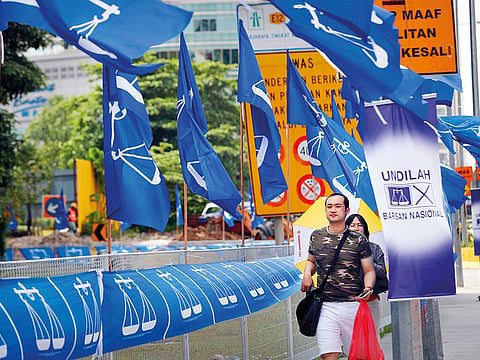Ahead of Malaysian polls, bots flood Twitter with pro-government messages
Malaysia will hold a general election on May 9 with Najeeb’s Barisan Nasional (BN) coalition, which is dominated by UMNO

Kuala Lumpur (Malaysia): Just weeks before Malaysia goes to the polls, automated accounts known as bots are flooding Twitter with tens of thousands of pro-government and anti-opposition messages, according to a review of the tweets by Reuters and a US digital media research institute.
Asked about the matter, San Francisco-based Twitter Inc said it was focused on identifying and suspending accounts that violate its spam policies.
“We continue to fight hard to tackle any malicious automation on our platform as well as spam accounts,” it said, without giving specific details.
A source close to the matter said the company had suspended 500 accounts involved in the messages on the Malaysian election since they involved spam or malicious automation.
Twitter bots, accounts which can post, like or resend tweets automatically, are not illegal in Malaysia and seem to be having minimal impact on its election campaign. But they have come under global scrutiny amid probes into Russian meddling in the 2016 US elections using social media platforms.
Ahmad Maslan, the information technology bureau chairman of Prime Minister Najeeb Razak’s United Malays National Organisation (UMNO), said he did not know who was behind the bot activity and that it was not his team.
The government’s communications and multimedia minister Salleh Said Keruak did not respond to calls or text messages seeking comment.
A researcher at the Digital Forensic Research (DFR) Lab of the Washington-based Atlantic Council think tank said over 17,000 bots tweeted content related to the Malaysian election over the last week.
Nine of the top 10 most active bot accounts containing anti-opposition hashtags and pro-government messages had Russian-sounding names and used the Cyrillic script, said Donara Barojan, a research associate at DFR.
“The prevalence of bots with Cyrillic screen names does not suggest that Russian social media users are meddling in the Malaysian elections, but does indicate that whoever is behind the campaign purchased some bots created by Russian-speaking bot herders,” she said.
Reuters was unable to establish where the tweets originated or which firm or individual may be behind the bot accounts.
Malaysia will hold a general election on May 9 with Najeeb’s Barisan Nasional (BN) coalition, which is dominated by UMNO, locked in a tough battle with former premier Mahathir Mohamad and his opposition alliance.
“SAY NO” The tweets included visuals illustrating Malaysian government policies and questioning the opposition’s promises.
Some tweets had photos of BN supporters carrying party flags and “I love PM” signs.
The tweets also include hashtags: either BN’s campaign slogans or anti-opposition phrases or both. The hashtags that express disapproval of the opposition coalition Pakatan Harapan (PH) include ‘#SayNoToPH’ and ‘#KalahkanPakatan’, which means “Defeat Pakatan” in Malay.
Two of the anti-opposition hashtags - ‘#SayNoToPH’ and ‘#KalahkanPakatan’ - were used around 44,100 times by 17,600 users during April 12-20 and 98 percent of the users appear to be bots, according to Barojan.
Many of the graphics attached to the tweets credited UMNO’s information technology department and some provided details of social media pages of BN-linked accounts. There was no evidence that these accounts are behind the automated tweets.
Syed Saddiq Syed Abdul Rahman, a youth leader in the opposition alliance, accused the BN coalition of being behind the bot campaign but added that the impact from the bot activity was “miniscule.” He did not elaborate.
Twitter is not as popular in Malaysia as Facebook, although a lot of political discourse appears on the platform.
Automated tweets of this scale are meant to generate traffic around the content they post, and get ‘human’ users to participate, but that has not happened yet in Malaysia, according to DFR Lab.
Twitter and Facebook are under scrutiny in the United States where lawmakers suspect their platforms were used as part of an alleged Russian effort to sway the 2016 US presidential election in favour of Donald Trump. The Kremlin has denied the accusations.
The Times reported last year that Russian Twitter accounts posted almost 45,000 messages about Brexit in the 48 hours around the 2016 referendum in Britain, and that many of the messages appear to have come from bots or cyborg accounts.
Russia has denied meddling in Brexit.
Sign up for the Daily Briefing
Get the latest news and updates straight to your inbox



